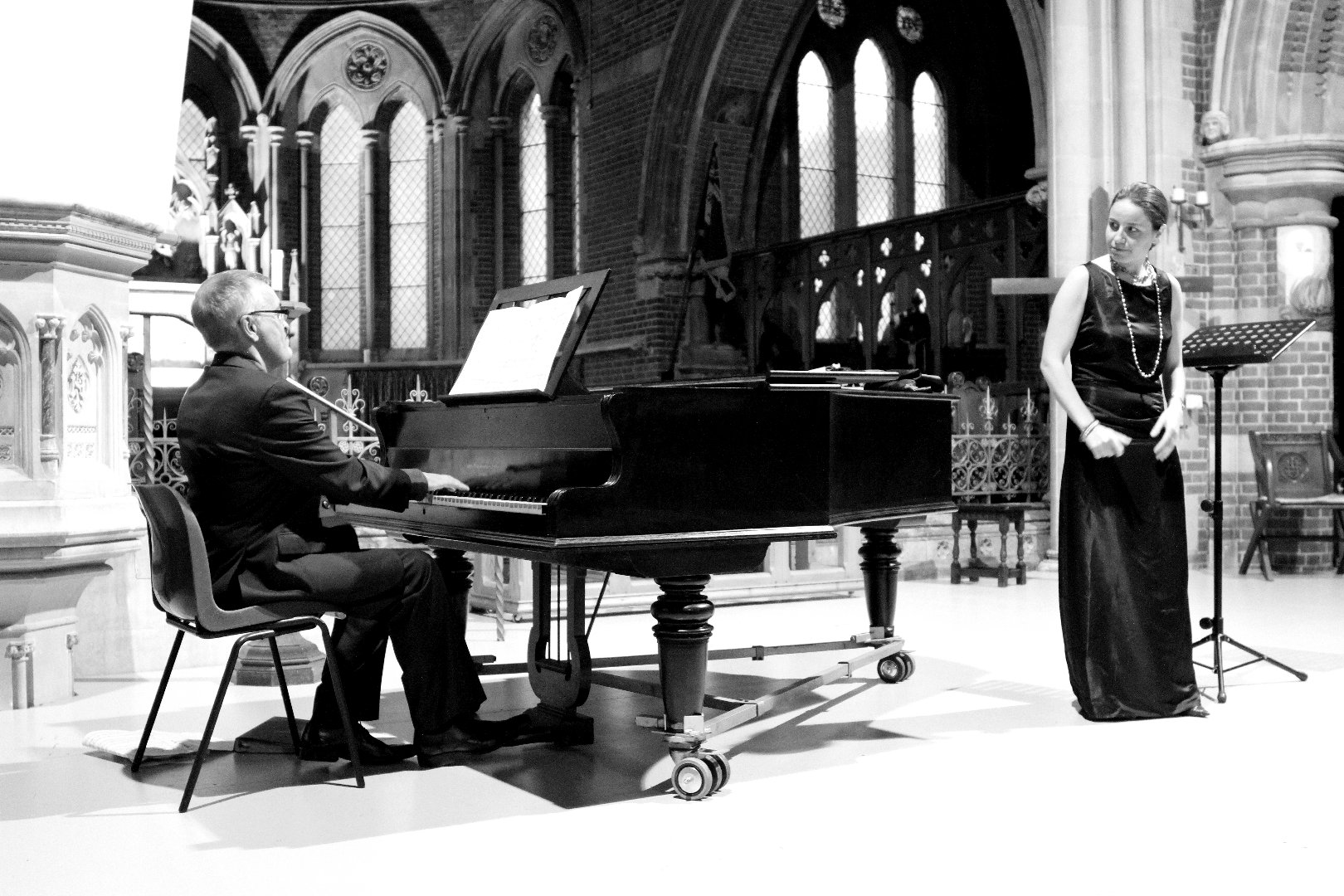“Recital”, 14 June 2012, 7:30 pm
St. Denys Church, Southampton, UK
Part I: Venus as a Boy
Stephano’s aria from Roméo et Juliette, libretto by J. Barbier (Act III, Scene 2).
Cherubino’s canzona from Le nozze di Figaro, libretto by L. Da Ponte (Act II, Scene 3)
Siebel’s aria from Faust, libretto by J. Barbier (Act III, Scene 1).
Smeton’s aria from Anna Bolena, libretto by F. Romani (Act I, Scene 9).
Dalila’s aria from Samson et Dalila, libretto by F. Lemaire (Act II)
Erika’s aria from Vanessa, libretto by G. C. Menotti (Act I, Scene 1)
Venus’s aria from One Touch of Venus, libretto by O. Nash (Act I)
Part II: Pardon My English
The Man I Love
George Gershwin
So in Love (from Kiss me, Kate)
Cole Porter
Je ne t’aime pas
Kurt Weill
Let’s call the whole thing off (from Shall we Dance)
George Gershwin
Wolfgang Amadeus Mozart (1756-1791) ‘Voi che sapete’
Cherubino’s Canzona from Le nozze di Figaro , libretto by Lorenzo Da Ponte (Act II, Scene 3). At Susanna’s urging, the young page Cherubino sings the Countess a love song that he wrote for her.
George Friderich Handel (1685-1759) Dove sei, amato bene ?
Bertarido’s aria from Rodelinda, libretto by Nicola Francesco Haym (Act I, Scene 6). In the Royal Palace in Milan, Rodelinda, wife of the King Bertarido, presumed dead in an invasion by the usurper Grimoaldo, laments the loss of her husband and kingdom. Grimoaldo arrives to seek her hand, but the proud queen declares that the man who has robbed her of all she held dear will never buy her love. In fact, Bertarido is alive; disguised as a Hun, has given out word of his death to buy time to win back his kingdom. In a cypress grove, he ponders the vain pomp of his newly erected tomb, longing for comfort from his beloved wife.
Charles Gounod (1818-1893) ‘Que fais-tu, blanche tourterelle’
Stephano’s aria from Roméo et Juliette, libretto by Jules Barbier (Act III, Scene 2). A street in Verona, Italy, 14th century. Romeo’s page Stephano baits the Capulets with this mocking song which states that the white dove of the Capulets (which symbolizes Juliet) will go free one day (implying that she will choose to leave the Capulet family to marry Romeo).
Charles Gounod ‘Faites- lui mes aveux’
Siebel’s aria from Faust, libretto by Jules Barbier (Act III, Scene 1). The garden of Marguerite in a German city, 16th century. Siebel gathers flowers to give to Marguerite. He hopes that they will convey his love to her, but they die as soon as he plucks them. He remembers the evil man who he met earlier (Mèphistophéles) and believes that he has been cursed by him. He dips his hands in holy water to remove the curse and goes back to picking flowers.
Camille Saint-Saëns (1835-1921) ‘Mon coeur s’ouvre à ta voix’
Dalila’s aria from Samson et Dalila., libretto by Ferdinand Lemaire (Act II). The valley of Soreck, ancient Palestine. In an attempt to close the trap which she has set for Samson, Dalila tells Samson seductively that she is completely his if he wants her. She begs him to respond to her caresses, hoping that he will finally let go of all other things and concentrate completely on her, allowing the High Priest of Dagon to capture him.
Samuel Barber (1910-1981) ‘Must the Winter Come so Soon’
Erika’s Aria for Vanessa, libretto by Gian Carlo Menotti (Act I, Scene 1). A drawing room in Vanessa’s castle in a northern town first decade of the 20 century. In a question to Vanessa, her niece Erika asks why the winter must be so long and come so soon, bringing with it a gray dreariness to the forest in which the castle lies.
Kurt Weill (1900-1950) ‘I Am a Stranger Here Myself’
Venus’ Aria from One Touch of Venus., libretto by Ogden Nash (Act I). Venus tries to figure out why Rodney is resisting her and how love has changed in 3000 years.
Performers
Douglas Gould, Piano


Comments